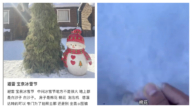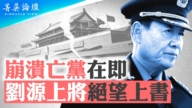【新唐人2014年05月06日讯】随着全球化、资讯化的发展,近年来,在中国大陆,外来语的使用日益泛滥,甚至频繁出现在正规出版物和正式文件中。为此,中共党媒《人民日报》多次发表社论,抨击外语词的涌入,破坏了汉语的纯洁和健康,引发民众热烈讨论。
近年来,WiFi、CEO、MBA、CBD、VIP、PM2.5等大量外语词,不经翻译就出现在大陆的报纸或杂志上,甚至出现在严肃的学术期刊里。《人民日报》继4月11号刊文抨击外来语滥用现象后,25号又一次指出,“零翻译”的外语词,既破坏了汉语文字的严整与和谐,影响了汉语表意功能的发挥,也消解了中国文化精深而丰富的内涵。
文章问道,汉语中夹杂大量英文,对汉语的纯洁和健康的伤害到底有多大?
中共教育部语言文字应用管理司司长姚喜双,日前对《人民日报》表示,教育部和国家语委正采取措施,规范外语词的使用。第一批外语词中文译名表已于去年9月发布,第二批和第三批外语词中文译名表,将于今年晚些时候发布。
原河北人民广播电台编辑朱欣欣:“其实汉语里面很多的辞汇都是从一些外文翻译过来的,比如佛教里面的一些词,他并不是完全固定的,他也不断的在发展变化的。不恰当的使用对语言的纯洁性可能有影响,但是这个事情又不是靠人为的、硬性的规定能够控制的。我主要怕的是,藉这种语言的问题来抵抗对西方的开放的心态,对西方先进文化的吸收。”
事实上不少大陆网友,对中共当局排斥外来语的做法持反对态度,有网友说,CCTV先改成“中央电视台”再说吧,更有网友直言:为何不声讨简体字破坏了汉语的纯洁性!
台湾宇光两岸文化经贸交流学会理事陈彦玲:“真正破坏汉语的,真正破坏我们祖先所留传下来的正体的汉字,事实上是中共发起的10年文化大革命,把5000年美好的文字,甚至用语给改了,文字是神传给的,当你懂得它的内涵跟规则的时候,它其实没有那么困难。”
朱欣欣:“比如友爱的爱、爱情的爱,繁体字里面有个心,简体字里面就没有心,这样对爱的理解和表达就不太好。没有心怎能有爱呢?当时简化字跟中共心态有关系,它方方面面都要把过去旧的东西革除掉。过去文字里面确实是有人神相通的信息在里面,不单单是一个符号的问题,文字确实是有它的奥秘在里面,人们应当对传统心存敬畏。”
美国《纽约时报》中文网指出,中共当局对减少使用外来词的明显努力,是为了削弱西方文化对中国的影响力。
陈彦玲:“语言背后代表了一个文化,所以当你接受他的语言,你也会有机会去了解更多在那个地方所发生的事情,你会发现,原来西方的总统是怎么办事的,总统是怎么产生的,人就会去看,在中国,我们是怎么被管的。在思想上他会更开阔,他判断的能力更强了。如果体制的掌权者只维护自己的利益,他当然会害怕。”
据大陆《新京报》报导,最近在一个名为“城市词典”的美国俗语和俚语网站上,出现了大陆网络热词,如:“no zuo no die(不作死就不会死)”、“Tuhao(土豪)”、“people mountain people sea(人山人海)”、“Da Ma(大妈)”、“you can you up(你行你上)”等。
报导说,作为目前世界上使用最广泛的语言,英语一直在吸收外来语方面保持了较大的开放性。英语属于日耳曼语族,但现代英语中,日耳曼语族的成分仅占全部词汇量的1/5,80%的词汇为外来词,而且这一比例还在逐年上升。
重庆媒体人侯金亮在博文中指出,10几年前网络开始普及时,就有人反对使用外来语,事实上,“X光”、“B超”等外来词,因简洁明了而被广泛使用,已成为汉语基本词汇的组成部分,之前的担忧被证明是多余的。
美国“宾夕法尼亚大学”中文教授梅维恒(Victor Mair) 对媒体表示,语言的不断变化是“自然的”,借用其他语言的词汇,实际上是一种健康的现象。
采访/易如 编辑/陈洁 后制/孙宁
People’s Daily: Foreign Terms Damage Purity of Chinese Language
Borrowed foreign words are often seen in China today,
frequently appearing in publications and formal documents.
It is believed to be a trend along with globalization
and the development of information technology.
To this end, the state media, People’s Daily, criticized
the influx of foreign terms, saying they have destroyed
the purity and health of the Chinese language.
Let’s hear what people have to say about it.
Foreign terms such as WiFi, CEO, MBA, CBD, VIP, PM2.5
and others have become popular terms in Chinese print media
such as newspapers, magazines and even academic journals.
People’s Daily editorials criticized such phenomenon
on April 11 and 25, respectively, claiming the borrowed
foreign terms have harmed the purity and health
of the Chinese language.
These zero translation foreign terms have affected
the expression of Chinese language and the profound
and rich Chinese culture associated
with the Chinese language.
The article questioned the threat of the increased use
of foreign words to the purity and health of Chinese.
People’s Daily reported that the Ministry of Education has
released the first batch of Chinese foreign word translation
tables last September to promote the Chinese translation.
The second and third installments of official translations
are to be released later this year.
Zhu Xinxin, Former Hebei People’s Radio Editor: “In fact,
many Chinese terms have evolved from borrowing foreign
terms, such as those often seen in the Buddhism.
It is not fixed but constantly developing and changing.
Improper usage may affect the purity of the language.
But, this is not something that can be controlled
or regulated manually. I feel the language issue has been manipulated
to reject Western culture. I fear that’s their purpose."
Many Chinese netizens oppose the rejection
of foreign language by authorities.
A netizen criticized, “Change the CCTV logo first."
Others said bluntly, “Denounce the simplified Chinese.
That is what’s destroying the purity of the Chinese language!"
Chen Yanling, Director of Yu Guang cross-Strait economic
and cultural exchanges: “What has totally ruined the Chinese
language is the 10-year Cultural Revolution by the CCP.
Not only were the characters that had been transmitted
from 5,000 years of history destroyed, but also the meaning
of the words were changed.
The divine Chinese language is not so difficult once the true
meaning and principles are appreciated."
Zhu Xinxin: “Take the character love (Ai) as an example.
It contains a “heart" in the traditional character.
But, the heart was deleted in the simplified Chinese.
How can any one love without “heart"?
The CCP simplified the Chinese characters with
one purpose— to destroy everything from the past.
The relationship between mankind and the gods exists
in the traditional Chinese characters.
It’s not just some symbols, but true profound meanings
within the traditional Chinese characters.
People ought to be respectful of the tradition."
The New York Times analyzed that, “the apparent drive
to reduce the use of foreign words in Chinese is part
of a larger campaign to diminish the influence
of Western culture in China"
Chen Yanling: “Each language has its culture.
To accept a language is to learn about its customs.
You’ll realize how the president in the West would deal
with things, how the president was elected, compared
to how the Chinese are currently being monitored.
People will become more open minded and objective.
Those who are in power defending for self interest
will certainly reject foreign language out of fear."
Beijing News listed several popular Chinglish terms compiled
in web based dictionary Urban Dictionary, such as
“no zuo no die," “Tuhao," “people mountain people sea,"
“Da Ma, " “you can you up" and more.
The report said that English, as the most widely spoken
language today, has maintained a greater openness
in terms of its absorbtion of foreign words.
English, with its origins in Germanic language, maintains
only one fifth of the Germanic language but contains
an 80 percent foreign vocabulary, which continues to increase.
Hou Jinliang is a media professional. He wrote in Bowen: “There were people opposing foreign words 10 years ago when the Internet began to spread.
But, in fact, simple and easy to use terms such as X-ray and B-scan have become popular and widely used by Chinese. The worry was proved to be unfounded."
Victor Mair, professor of Chinese at the University of
Pennsylvania, told the New York Times that continuous
change in a language is “natural," and “borrowing words
from other languages is actually a healthy phenomenon."
Interview/YiRu Edit/ChenJie Post-Production/Sunning




























